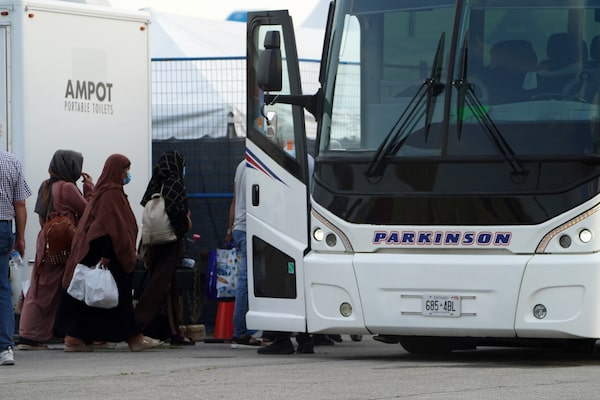
Refugees from Afghanistan board a bus after being processed at Pearson Airport in Toronto, on Aug. 17, 2021, after arriving indirectly from Afghanistan.Sean Kilpatrick/The Canadian Press
Last Sunday, Mursal Nabizada, a former member of Afghanistan’s parliament, was murdered at her home in Kabul. Her killers haven’t been identified, but it’s not a difficult crime to solve. As a woman who had worked for the previous Afghanistan government, Ms. Nabizada lived in constant danger under the brutal rule of the Taliban.
Two days later, in Canada, news broke that Global Affairs Canada plans to erect a plaque at its Ottawa headquarters to pay tribute to the government employees who contributed to the evacuation of nearly 3,700 Canadian citizens, permanent residents of Canada and Afghans in August, 2021, when Afghanistan fell to the Taliban.
There is no doubt that dedicated employees put in long and difficult hours during an unprecedented international crisis, and that some of them did so in the harsh and dangerous conditions unfolding in Kabul in the summer of 2021.
But erecting a $10,000 plaque as a participation medal in an inept evacuation, and doing it while the Taliban continues to attack women and throttle Afghans’ basic rights, is rightfully being criticized.
“To me, it seems unnecessarily inappropriate and insensitive when I think of what’s happening in Afghanistan,” Salma Ataullahjan, a Conservative senator, said this week. “What are we congratulating ourselves on?”
Good question. Here’s another: Why is the government apparently putting more energy into employee recognition than into doing a full public review of what went wrong during the 2021 evacuation, as a special parliamentary committee called on it to do in a report tabled last June?
As the committee’s report noted, the humanitarian crisis that erupted in Afghanistan after the United States announced that it would begin withdrawing its troops from the country as of May 1, 2021, had special significance for Canada.
Canada was a loyal partner in the NATO-led effort to rid Afghanistan of al-Qaeda and its Taliban enablers after the Sept. 11, 2001, terrorist attacks. A total of more than 40,000 Armed Forces personnel were stationed there from 2001 to 2014, when Canada ended its mission; 158 CAF members and one Canadian diplomat were killed in service.
When the U.S. announced its pullout in 2021 and Taliban forces advanced across Afghanistan, Canada had to scramble to safely evacuate not only its own citizens and permanent residents, but also the many Afghans who had served as embassy staff or as translators and guides to Canadian military personnel, aid workers and journalists. All of those Afghans, along with their family members, were targets of the Taliban.
The committee’s investigation into the evacuations led its members to doubt the government’s claim that the collapse of the Afghanistan government on Aug. 15, 2021, was a surprise. A number of expert voices had warned that the end would come sooner than anticipated, and that Ottawa needed to move quickly to protect its local allies and friends.
One of those warnings came in a July 26, 2021, letter to Marco Mendocino, the minister of immigration at the time, from a local group that said women parliamentarians were particularly worried about their safety.
The committee also heard from people who said Ottawa closed its embassy far too early, making it more difficult to get people out, and that the process for applying to come to Canada was insensitive to the conditions on the ground. Applicants were e-mailed English-language documents that had to be printed out, filled in, scanned and returned by e-mail, forcing them to come out of hiding to find internet access.
There was also a lack of communication between departments. The committee heard that some Afghans who received e-mails from Immigration Canada telling them to rush to the airport in Kabul were turned away at the airport by Global Affairs officials who didn’t have their names on a list. In some cases, family members were separated.
The committee’s report concluded that Ottawa should have assumed the country would fall quickly after the U.S. pullout was announced, should have been more cognizant that its local allies would be in danger, and should not have contributed to a worst-case scenario. Instead, thousands of people who had aided Canada were abandoned to their fates.
Those findings suggest a public re-examination of the evacuation is in order, so that Canadians know that Ottawa understands how badly it failed our Afghan allies.
As for that overpriced plaque on the walls of Global Affairs, it should have just three words: We are sorry.